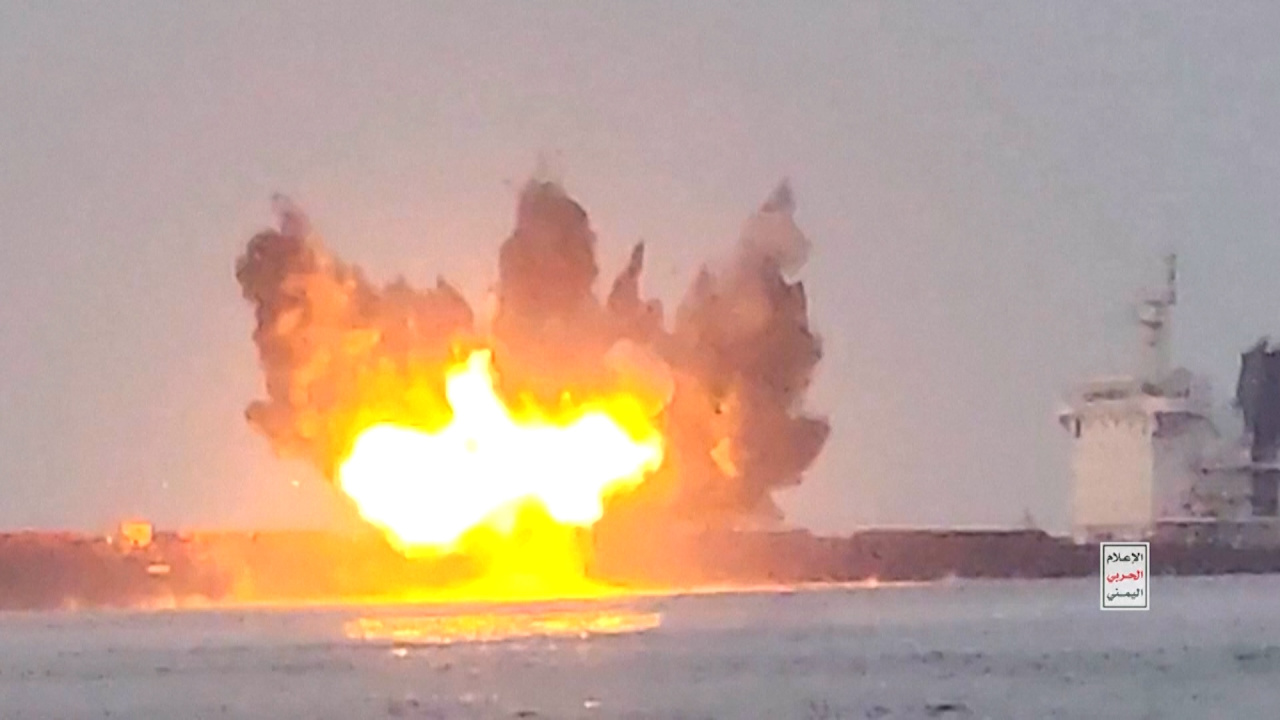Houthi Attack on Cargo Ship in the Red Sea
Yemen’s Iran-aligned Houthis claimed responsibility for an attack on a cargo ship in the Red Sea, stating that the vessel had sunk following the assault. This marks their first known attack on the high seas this year. The incident has raised concerns about the safety of one of the world’s busiest shipping routes.
The Greek operator of the ship, Stem Shipping, said they had no independent verification of the sinking. They also could not immediately confirm whether the ship had indeed gone down. However, the Houthis stated that they had allowed the 19 crew members to leave the Liberian-flagged bulk carrier, the Magic Seas, before the attack. All crew members were rescued by a passing merchant vessel and were expected to arrive in Djibouti later on Monday.
The United Arab Emirates reported that all 22 people aboard the Magic Seas had been successfully rescued after an AD Ports Group vessel, Safeen Prism, responded to a distress call from what they believed was a British-flagged commercial ship following an attack in the Red Sea. According to Stem Shipping, the ship was taking on water after the attack and remained at risk of sinking. The vessel was carrying iron and fertilizer from China to Turkey.
This attack ended half a year of relative calm in the Red Sea, which is a crucial shipping route connecting Europe and Asia through the Suez Canal. Houthi attacks from the end of 2023 through late 2024 disrupted shipping in the area. The group launched more than 100 attacks on ships in the Red Sea, the Gulf of Aden, and the Bab al-Mandab Strait, citing solidarity with the Palestinians after the war erupted in Gaza in 2023. However, these attacks had ceased this year, with the last known incident occurring in December.
Details of the Attack
Houthi military spokesperson Yahya Saree stated in a televised statement that the vessel was targeted on Sunday after naval forces issued warnings and calls that were ignored by the ship’s crew. He mentioned that the attack involved two unmanned boats, five missiles, and three drones.
According to advisories from the United Kingdom Maritime Trade Operations (UKMTO) and British security firm Ambrey, which monitor security incidents in the region, the vessel was first approached by eight small boats that opened fire and launched self-propelled grenades. Armed guards returned fire. The ship was later struck by four remote-controlled boats, or Unmanned Surface Vehicles (USVs), and targeted with missiles. Two of the USVs impacted the port side of the vessel, damaging its cargo. UKMTO reported that the strikes triggered a fire onboard.
Separately, the Israeli military announced that it had struck three Houthi-controlled ports. There was no indication that these strikes were linked to the attack at sea.
Impact of Houthi Attacks
During their campaign against shipping, Houthi attackers have sunk two vessels, seized another, and killed at least four seafarers. The attacks prompted global shipping firms to reroute vessels around the Horn of Africa, increasing global shipping costs and times. In response, the United States and its allies conducted air strikes last year.
Tensions in the region escalated in June following a 12-day war between Israel and Iran, with Washington joining U.S. airstrikes on Iranian nuclear sites. President Donald Trump had previously announced a halt to U.S. strikes on the Houthis, stating that the group had agreed to stop interfering with key shipping routes.
Ongoing Concerns
The recent attack highlights the ongoing risks faced by maritime traffic in the Red Sea. As international efforts continue to address the situation, the focus remains on ensuring the safety of ships and seafarers navigating this critical route. The incident underscores the need for coordinated responses from regional and global actors to prevent further disruptions and protect lives at sea.







